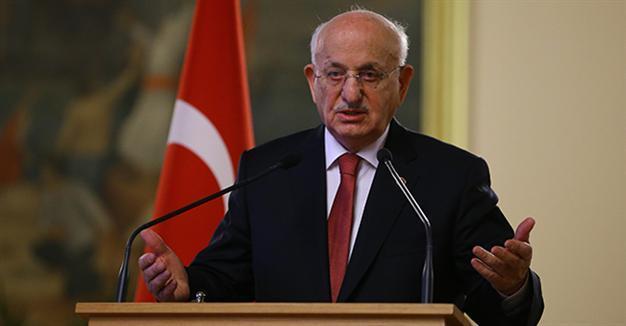MHP names members for charter panel with hopes of strengthening parliamentary system
ANKARA

Parliamentary Speaker İsmail Kahraman answers questions during a press briefing on Jan. 8, 2016. AA File Photo
The Nationalist Movement Party (MHP) has named three lawmakers to represent the party in a parliamentary commission to be tasked with drafting a new constitution, with party leader Devlet Bahçeli underlining their aspirations of strengthening the current parliamentary system.But Parliamentary Speaker İsmail Kahraman voiced his support for a transition from the current parliamentary system to a presidential system.
“We will present our contribution and desire so that political parties, which are indispensable institutions of democracy, can achieve a result in conciliation before history and our nation in making a constitution that will strengthen the current parliamentary system by ensuring its speedy, effective and productive work,” Bahçeli said in a written response to Kahraman delivered late on Jan. 12.
Late last week, Kahraman announced that he had sent letters to the leaders of all four political parties represented in parliament for the formation of a commission in order to draft a new constitution.
“I will head the conciliation commission and the commission will determine its working principles itself. I think that a new constitution will be issued,” said Kahraman.
Opposition parties have agreed for the need to replace the current constitution, which was passed in the wake of the 1980 coup and still bears the stamp of its military authors, in a country which is a potential candidate for European Union membership, but they have not lent support to proposals from the ruling party to entirely overhaul what is now a largely ceremonial presidency. A similar cross-party panel attempted for two years to reconcile differences and agreed on 60 article changes before giving up in late 2013 due to disagreements on issues such as the definition of citizenship and the protection of religious freedoms.
In remarks in the latest issue of a journal published by the Turkish Parliamentarians Union (TPB), Kahraman favored a presidential system.
“A new constitution which is not an imitation, which is in line with the society’s spiritual roots and moral and material values and which is not bound by persons should be made. In my opinion, this constitution should be a constitution based on a presidential system,” he said.
Referring to parliament’s work in 2013, Kahraman said: “Before this work, my personal opinion was that a semi-presidential system would be appropriate. But when I researched and saw different examples in the world, I became convinced that the presidential system would be more useful. Of course, these matters should be dealt with in consensus; one should not be afraid of the presidential system by perceiving it as a system according to a person.”
Kahraman also argued that a presidential system would eliminate “double-headedness.”
“Today, Turkey is not suffering from a problem such as double-headedness because there is a prime minister and a president who are from the same party,” he said.
President Recep Tayyip Erdoğan, the founding leader of the ruling Justice and Development Party (AKP), has repeatedly called for a formal shift to a presidential system, with the AKP’s current leader, Prime Minister Ahmet Davutoğlu, also expressing support.
A veteran conservative politician, Kahraman served as minister of culture in the mid-1990s under Necmettin Erbakan’s governments, which were later shut down by the Constitutional Court for anti-secular activity. Kahraman is known as one of Erdoğan’s closest associates. After a break of 12 years, he returned to active politics in the Nov. 1 elections.
















